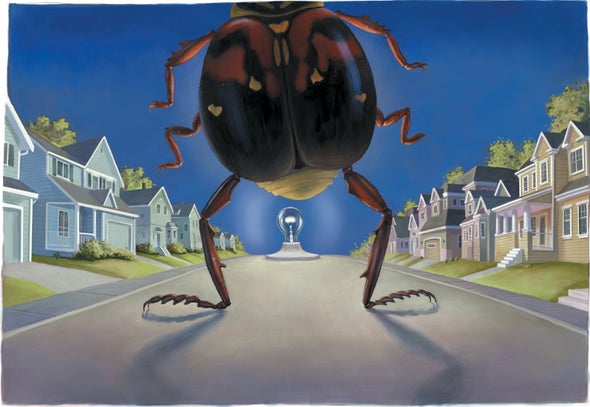For many years we've been hearing about a so-called War on Christmas. And for centuries we've heard that the meek shall inherit the earth. But what we haven't heard a lot about is that for decades Christmas has been waging a war on the meek. I'm talking, of course, about decorative lights and insects.
Outdoor lighting in general poses a deadly threat to insects. That's according to a study published online in November 2019 in the journal Biological Conservation, entitled “Light Pollution Is a Driver of Insect Declines.”
The article notes that steep drops in insect numbers around the world have happened over the past couple of decades in what amounts to an “insect apocalypse.” The blame is usually assigned to “habitat loss, chemical pollution (especially pesticide use), invasive species, and climate change.” But the authors contend that the forces of lightness have not gotten their due. And they cite what they call “diurnal bias.”
The allegorically intoxicated man famously searches for his lost wallet under the streetlight where he can see better. Conversely, so may exist “a preference among ecologists for studying daytime phenomena”—diurnal bias. When would you rather count bugs, after a nice breakfast or four hours before breakfast when you can barely see your hand in front of your bleary eyes?
The research team thus asserts that a preference for sleeping at night “has led insect conservationists to overlook another widespread habitat disturbance, pollutant, and method of insect control: artificial light at night (ALAN).”
ALAN's iniquitous influence occurs “through its interference with the development, movement, foraging, and reproductive success of diverse insect species.” Another factor is light's “positive effect on insectivore predation.” That is, birds, bats, amphibians and arachnids aren't stupid—if a lot of insects start swirling around lights in the night, predators will also show up. The result is a big buggy banquet of hefty hexapodal helpings that precipitates a plummeting in part of the Pancrustacea population.
Sadly, ALAN spikes sharply after Thanksgiving, as many people add festive illumination to the exterior of their houses to celebrate the approach of Christmas. As you read these words in early 2020, stubbornly bedecked houses may still be sucking electricity out of the grid at unusually high rates.
Many neighborhoods, mine included, have a particular house that embraces the spirit of the season in such an outsized way as to produce a radiant haze perhaps visible to exoplanet hunters in other star systems. (For an example, search online using the term “Griswold electricity meters.”) The massive carnage to insects is accompanied by lines of slow-moving cars belching noxious gases in front of the home, just to catch a glimpse of the outward manifestation of the family's deep-rooted obsession.
The task then must be to lessen “the ecological consequences of ALAN on insects while still maintaining sufficient levels of nighttime illumination for human safety and enjoyment,” the researchers write. Fortunately, their study offers some solutions to this existential pestilential crisis.
The first is of the category in which one both possesses a pastry and partakes of it as well: “Monochromatic LEDs can be engineered to produce light of any desired spectral composition,” the investigators write. “Therefore, once we know the specific wavelength affinities of insects, we can in theory design lights with minimal output in the wavelengths that most affect insect fitness.”
The second is astonishingly ingenious: turn some of the lights off. (One must wonder if a paradoxical and figurative lightbulb came on above the scientists' heads when they came up with the idea of turning the lights off.) “In many cases,” they write, “it is far easier, quicker, and cheaper to shield, dim, or turn off a light source than it is to find the particular bulb type or narrow bandpass filter that makes its emissions visible to humans alone.” Help end the war on insects. It is better to blow out one candle than to curse the planet.


